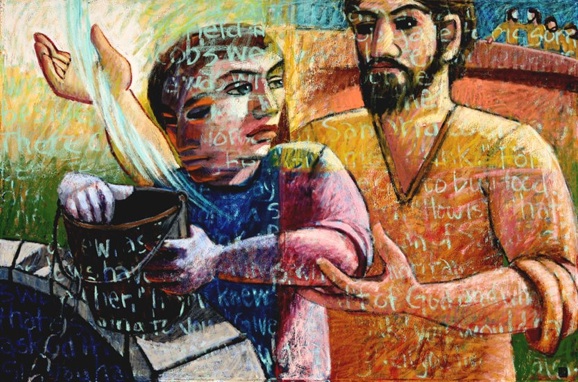
Today’s scripture is easy to follow, but without some background information, it’s also easy to misunderstand.
Samaria: For Jews in Israel, Samaria is a place to be avoided. Before Solomon’s death 1,000 years earlier, the regions of Samaria and Judea were part of a united Israel. After the rebellion that divided the kingdom, Samaria became a hotbed of idol worship. The northern kings made alliances that corrupted the people by introducing foreign customs and strange gods. They even had the nerve to build a temple to the True God on Mt. Gerizim to rival the one in Jerusalem. By the time the twelve are traveling with Jesus, it has long been evident that the Samaritans have lost their way. By marrying outsiders imported from Assyria during their occupation of the land, the Samaritans have polluted the land. Israel’s Jews consider them to be half-breeds—mongrels—impure and unworthy. And yet while it’s a place to be avoided, it’s the land that exists between Judah (Jerusalem) in the south and Galilee in the north. You can take the long way around it, or do like Jesus here and the shortcut straight through it.
Jacob’s well (site where the story unfolds) : Throughout the First Testament wells are sites of romantic encounter, much like in a romantic comedy the eventual lovers often bump into each other spilling papers and packages. Could it be that the disciples are upset (in verse 27) when they return to find Jesus talking with a woman at a well because they are thinking of such stories, as happens in Genesis 24 Abraham’s servant finds a bride for Isaac, in Genesis 29 Jacob finds his future wife Rachel and Moses, in Exodus 2, meets his future wife Zipporah.
The woman with five husbands: She has either been divorced or widowed five times. We tend to think of her as a sexually or morally loose woman, yet it’s much more likely that she has been divorced five times because she is barren, unable to have children – the worst thing possible for a woman at the time. She most likely is living with the brother of her 5th husband, who was obligated to take her in should his brother die, or leave his wife. (Deuteronomy 25:5-6) She is rejected by all, not because of what she’s done, but because of something she cannot control or change. Meeting Jesus rocks her world.
The Woman as a Radical Evangelist: the woman is the only other person to testify, besides John the baptizer (John 1:6-8) to the life-changing experience of being in a relationship with Jesus. We forget that by the time of Christ, the role of women had drastically changed for the worse in Israel/Palestine. In theory, women were held in high regard by first-century Jewish society, but in practice, this was not always true.Women were not allowed to testify in court, engage in commerce and would rarely be seen outside her home. The women with whom Jesus spoke were very likely illiterate since the rabbis did not consider it incumbent upon women to learn to read in order to study the Scriptures. This story, the last verse, is the only use of the word “Savior” in John’s gospel, the only time Jesus is called this. The word “to save” in Greek means simultaneously “to heal” “to deliver” “to make whole”. How then is Jesus Savior of the World?
Questions for the practice of Examen & Contemplation
- What shimmers for you in this story ?
- With whom do you identify in the story? Why?
- What good news is God’s Spirit speaking to you through this story?
Download a PDF Study Guide of John 4 (which I use for a class at @CAPCOakland) HERE.